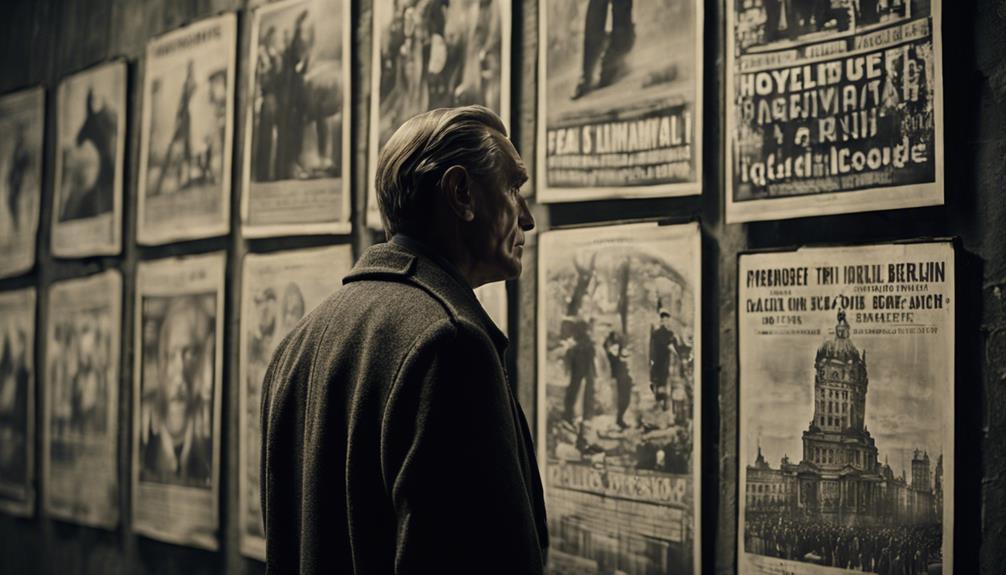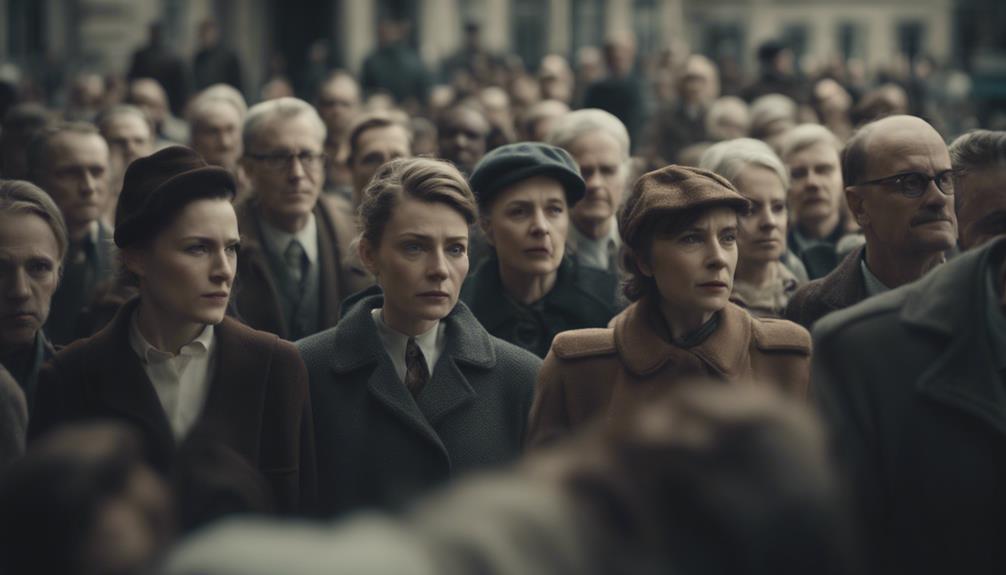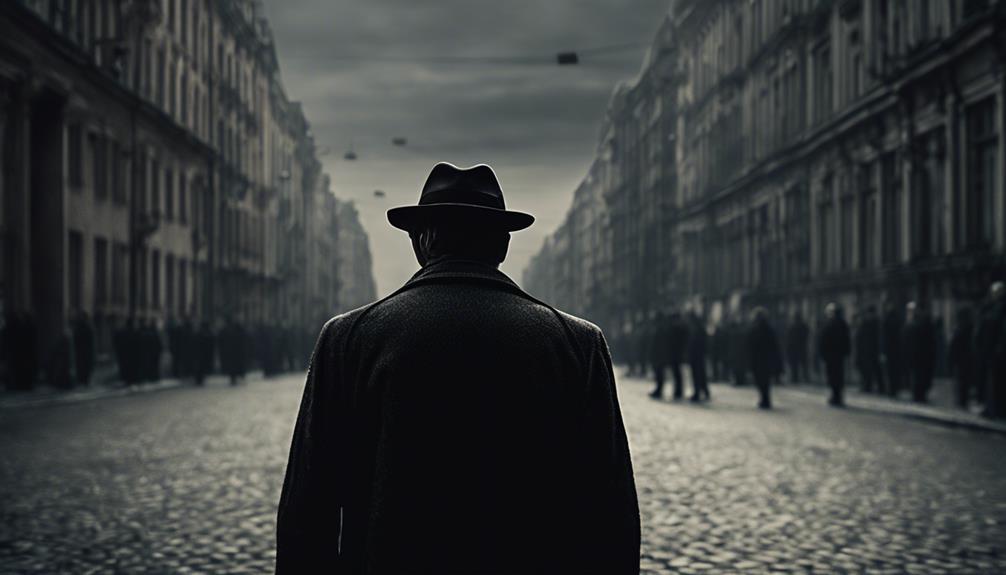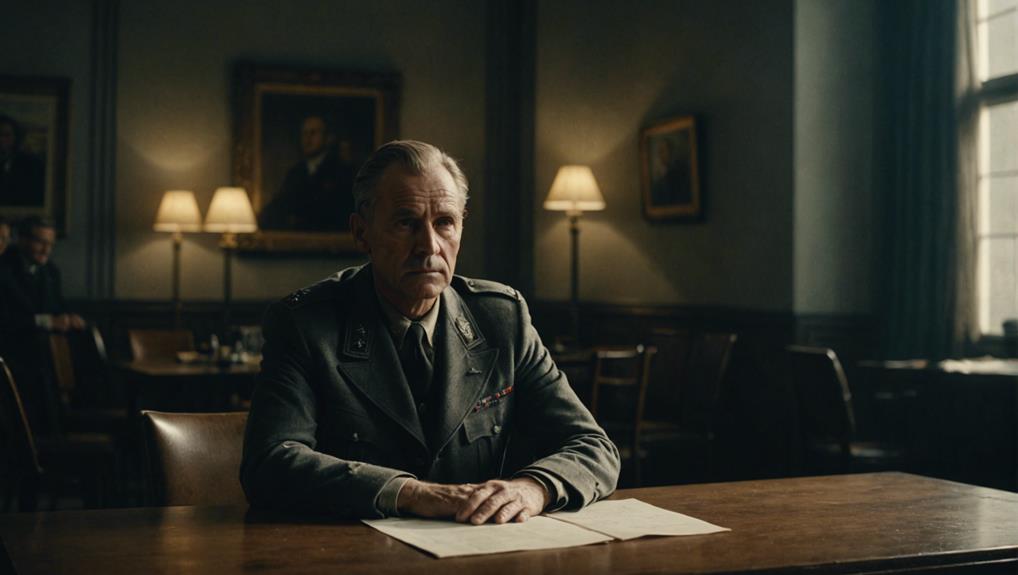Step into the gripping narrative of 'Alone in Berlin,' where courage defies tyranny. Witness Otto and Anna Quangel's defiance against the oppressive Nazi regime through small acts of resistance. Themes of fear and courage intertwine, revealing the moral dilemmas faced by those who stood against tyranny during wartime. Discover the everyday heroism and solidarity portrayed in this tale of resistance, highlighting the enduring spirit of rebellion. Uncover the consequences, betrayal, and oppression faced by those who dared to defy the norm. This story unfolds a world where ordinary individuals become beacons of resistance.
Background of World War II Berlin
During the tumultuous times of World War II, Berlin found itself at the epicenter of Nazi power and terror. Among the ordinary citizens maneuvering the oppressive regime were Otto and Anna Quangel, a German couple who'd later become known for their courageous acts of resistance.
Living in a city engulfed by fear, surveillance, and propaganda, the Quangels defied the norms of complacency by quietly challenging the Nazi regime.
In the midst of ubiquitous control and suppression, the Quangels' story sheds light on the harsh realities faced by those who dared to oppose. Their actions, while seemingly small in the grand scheme of Nazi power, symbolize the resilience and bravery of individuals standing up against tyranny.
Through the lens of the Quangels' defiance, readers are given a glimpse into the immense risks and consequences associated with resisting the Nazis, as well as the profound impact that even modest acts of resistance can have in a totalitarian state.
Otto and Anna Quangel's Defiance
In the heart of World War II Berlin, Otto and Anna Quangel, a working-class couple, undertook a dangerous mission to challenge the oppressive Nazi regime through their courageous acts of resistance. Inspired by the true story of Otto and Elise Hampel, the Quangels initiated a perilous endeavor to defy the regime by writing and distributing anti-Nazi messages on postcards.
These seemingly small acts of resistance carried immense significance, symbolizing the resilience of ordinary individuals against tyranny.
Despite the risks involved, the Quangels persisted in their opposition, driven by a deep sense of moral duty and a desire to resist injustice. Their bravery caught the attention of author Hans Fallada, who immortalized their story in the novel 'Alone in Berlin', shedding light on the power of individual resistance in the face of overwhelming adversity.
The Quangels' unwavering commitment to their cause not only cost them their freedom but ultimately their lives, serving as a poignant reminder of the sacrifices made in the pursuit of justice and freedom.
Themes of Fear and Courage

You'll explore how fear can grip individuals, paralyzing them in the face of danger, while courage empowers them to act against oppressive forces.
The characters in 'Alone in Berlin' embody this dichotomy, showcasing the internal struggle between succumbing to fear and finding the strength to resist.
Through their actions, Otto and Anna Quangel exemplify the bravery needed to confront tyranny and stand up for what's right.
Fear's Paralyzing Grip
Amidst the oppressive atmosphere of Nazi Germany, fear's paralyzing grip emerges as a central theme in 'Alone in Berlin,' showcasing the internal struggles faced by those seeking to resist tyranny.
Hans Falladas' novel explores the psychological and emotional challenges of the German Resistance, particularly through the lens of the Quangels family. The Quangels' journey reflects the fine line individuals walk between succumbing to fear and summoning the courage to take a stand.
In 'Alone in Berlin,' fear is depicted as a formidable force that inhibits action, rendering resistance a challenging task. The characters grapple with their fears, illustrating the complexities of confronting resistance in a regime where fear reigns supreme.
Through the Quangels' narrative, Falladas masterfully captures the paralyzing effects of fear, painting a vivid portrayal of the internal turmoil faced by those who dare to challenge oppression.
Ultimately, 'Alone in Berlin' poignantly showcases the gripping power fear holds over individuals in the face of overwhelming tyranny.
Courageous Acts Within
Within the pages of 'Alone in Berlin,' the courageous acts of resistance by Otto and Anna Quangel shine a light on the themes of fear and courage in the face of tyranny. Despite the ever-looming presence of the Gestapo, Otto and Anna undertake a clandestine mission to distribute postcards denouncing Hitler's regime, inspired by the loss of their son in the war.
Their bravery is juxtaposed with the ruthless pursuit of Inspector Escherich, who symbolizes the oppressive force of the Nazi regime. As the Quangels navigate the treacherous landscape of wartime Berlin, their small acts of defiance resonate as powerful gestures of resistance against a backdrop of fear and oppression.
Hans, a co-worker turned resistance fighter, joins their cause, further illustrating the strength found in solidarity and standing up against injustice. 'Alone in Berlin' captures the essence of moral courage in the face of extreme adversity, portraying the internal struggles and external risks undertaken by individuals determined to resist tyranny.
Moral Dilemmas in Wartime
You face tough ethical choices in wartime, making decisions under immense pressure. The consequences of your actions weigh heavily as you navigate the moral dilemmas of resistance.
In 'Alone in Berlin', characters grapple with the ethical challenges of standing against oppressive regimes.
Ethical Choices in Conflict
In times of conflict, individuals often face moral dilemmas that test their principles and courage. In 'Alone in Berlin,' characters like Otto and Anna Quangel confront the German tyranny of the Nazis, highlighting the ethical choices people must make in resisting oppression.
The novel explores the complexities of standing up against tyranny, shedding light on the sacrifices and consequences of resistance. Hans Fallada's narrative emphasizes the challenges of maintaining integrity and ethics in the face of extreme adversity.
The theme of moral dilemmas in wartime underscores the internal struggles faced by individuals grappling with the decision to resist or comply with oppressive regimes. As the characters navigate the ethical minefield of wartime Germany, they're forced to confront the harsh realities of their choices and the impact on their lives.
Through their experiences, readers are compelled to reflect on the ethical challenges posed by conflict and the courage required to uphold one's values in the face of tyranny.
Decision-making Under Pressure
Characters in 'Alone in Berlin' navigate through intense moral dilemmas in wartime, confronting the profound challenges of decision-making under pressure.
Otto Hampel's brave decision to resist the Nazi regime by distributing postcards denouncing Hitler and the war exemplifies the moral dilemmas faced by individuals during WWII. Despite the risk of being caught and facing severe consequences, Hampel chose to take a stand against injustice, highlighting the internal struggle many faced in deciding whether to resist or comply with oppressive regimes.
The Gestapo file documenting the Hampels' anti-Nazi resistance underscores the gravity of their choices and the dangers associated with defying the regime. As characters like Enno and Eva Kluge grapple with their responses to the atrocities of the Nazi regime, the moral dilemmas they encounter shed light on the various ways individuals navigated ethical decisions during wartime.
'Alone in Berlin' captures the complexities of decision-making under pressure in a totalitarian state, showcasing the moral courage and internal conflicts that defined this tumultuous period in history.
Consequences of Tough Choices
Exploring the intricacies of wartime moral dilemmas, 'Alone in Berlin' portrays the profound repercussions that arise from making tough choices in the face of oppressive regimes. The consequences of tough choices are vividly illustrated as characters grapple with deciding between resistance and compliance, showcasing the moral dilemmas inherent in wartime.
Everyday heroism is exemplified through the characters' courageous decisions that challenge their values and beliefs, emphasizing the extraordinary bravery required to stand up against tyranny. Solidarity among resistance members is a central theme, underscoring the importance of unity in facing adversity and highlighting the strength found in collective action.
Despite the risks involved, characters in 'Alone in Berlin' must navigate the treacherous landscape of betrayal as they confront the consequences of their choices and question the loyalty of those around them. Through these intricate moral dilemmas, the novel explores the complexities of wartime decision-making and the enduring impact of tough choices on individuals and society.
Everyday Heroism and Solidarity

The portrayal of everyday heroism and solidarity in 'Alone in Berlin' serves as a poignant reminder of the power of ordinary individuals to defy injustice and inspire change. Through the courageous actions of Otto and Anna Quangel, who engage in resistance by distributing anti-Nazi postcards, the novel showcases how small acts of everyday heroism can spark a ripple effect of solidarity within a community.
The Quangels' bravery not only challenges the oppressive regime but also encourages others, like Enno and Eva Kluge, to confront the moral dilemmas of standing up against tyranny. Inspector Escherich's relentless pursuit of the Quangels underscores the harsh consequences of resistance, shedding light on the risks and sacrifices involved in defying a totalitarian system.
'Alone in Berlin' resonates with readers by highlighting the themes of everyday heroism and solidarity, emphasizing the collective strength found in unity and the unwavering courage needed to combat oppression.
Consequences of Resistance
Facing the Nazi regime head-on, the Quangels in 'Alone in Berlin' experienced dire consequences for their acts of resistance. Their small but significant defiance against the oppressive regime resulted in their arrest, trial, and eventual execution. The story portrays the harsh reality of resistance, showcasing the high personal cost and sacrifices individuals like the Quangels had to endure when standing up against tyranny.
The consequences of resistance in 'Alone in Berlin' highlight the risks involved in opposing a powerful and authoritarian government. The Quangels' bravery in challenging the status quo led to severe repercussions, illustrating the dangers of going against the norm during a time of intense oppression.
Through their story, the novel sheds light on the sacrifices and hardships faced by those who choose to resist, emphasizing the heavy toll it takes on individuals who dare to challenge an unjust system.
Betrayal and Oppression

Amidst the resistance against the Nazi regime in 'Alone in Berlin', betrayal and oppression loom large over Otto and Anna Quangel's harrowing journey. The Quangels' defiance of tyranny exposes them to the harsh realities of oppression and the risks associated with standing up against the oppressive regime.
As they distribute postcards denouncing Hitler and the government, the weight of betrayal by those they trust hangs heavy over their heads. The oppressive nature of the Nazi regime becomes glaringly evident as the consequences of resistance unfold before them, forcing them to navigate moral dilemmas and make difficult decisions.
Through the Quangels' story, the novel sheds light on the dangers of opposing a tyrannical regime, emphasizing the challenges faced by those who dare to resist. In the face of betrayal and oppression, Otto and Anna's struggle embodies the harsh truths of wartime resistance, illustrating the sacrifices and risks involved in standing up for what's right.
Enduring Spirit of Rebellion
Embodying resilience and defiance, the characters in 'Alone in Berlin' exemplify the enduring spirit of rebellion in the face of tyranny. Through their acts of resistance, Otto and Anna Quangel symbolize the unwavering determination to challenge oppressive systems and fight for what's right.
Here are three key aspects that highlight the enduring spirit of rebellion portrayed in the novel:
- Explore in-depth Acts of Defiance: The Quangels' decision to distribute postcards denouncing Hitler's regime showcases the power of individual resistance in a society ruled by fear and conformity.
- Courage in the Face of Tyranny: Despite the risks involved, Otto and Anna demonstrate immense courage in standing up against the injustices perpetuated by the Nazi regime, inspiring others to resist as well.
- Scrutinize Moral Dilemmas and Consequences: The novel delves into the complexities of resistance, exploring the moral dilemmas faced by the characters and the repercussions of their defiance, illustrating the high stakes involved in challenging authoritarian rule.
Conclusion
So there you have it, folks. 'Alone in Berlin' shows us that even in the darkest times, there are always those willing to stand up against tyranny.
So next time you're feeling a bit rebellious, just remember the Quangels and their daring acts of defiance. Who knows, maybe you'll find yourself writing anti-Nazi postcards in no time.
Just don't forget the consequences – they're a real buzzkill.



